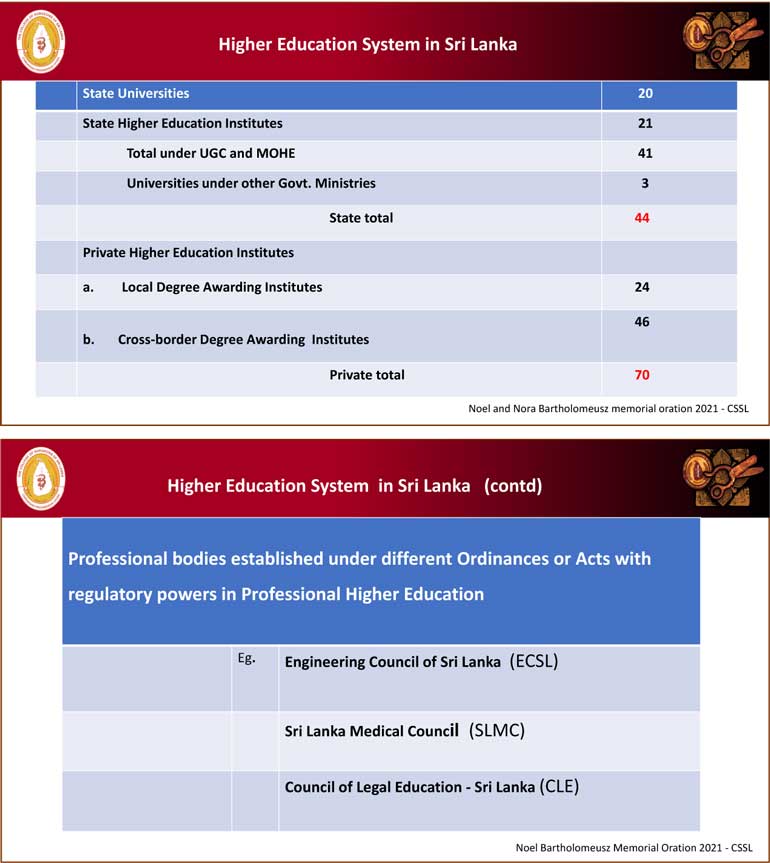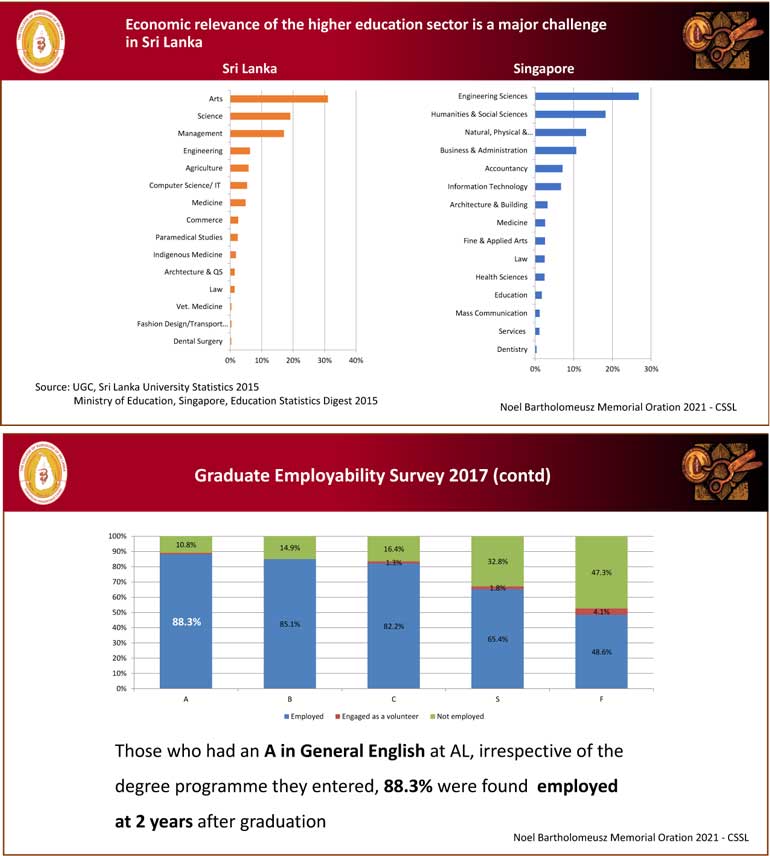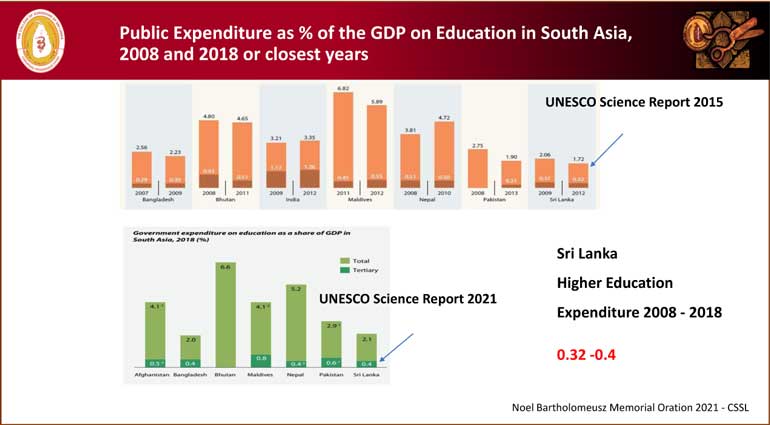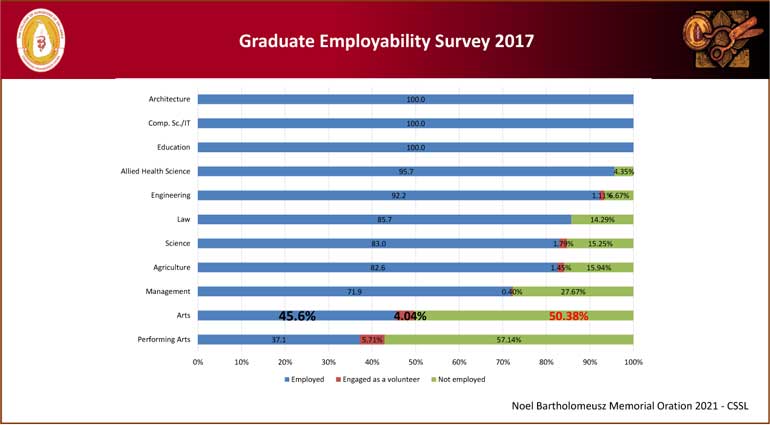Friday Feb 20, 2026
Friday Feb 20, 2026
Tuesday, 14 December 2021 00:00 - - {{hitsCtrl.values.hits}}
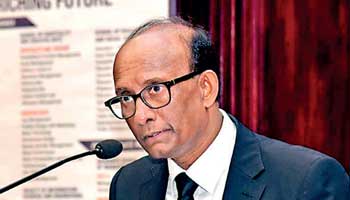 The 50th anniversary of the College of Surgeons of Sri Lanka was celebrated recently with an International Medical Conference attended by surgical associations of all SAARC countries, The Royal College of Surgeons of Edinburgh, The Royal College of Physicians and Surgeons of Glasgow and The Association of Surgeons of Malaysia. The delegations were physically present headed by the presidents of surgical associations and societies of the countries. The event also saw the presentation of the inaugural Dr. Noel Bartholomeusz Oration by Consultant Surgeon Prof. Mohan de Silva, Emeritus Professor Surgery, former Dean of the Faculty of Medical Sciences University of Sri Jayewardenepura and former Chairman of the University Grants Commission. It was presided over by CSSL President Prof. Srinath Chandrasekara and the Chief Guest was Prof. A H Sheriffdeen. Following is part 2 of the oration:
The 50th anniversary of the College of Surgeons of Sri Lanka was celebrated recently with an International Medical Conference attended by surgical associations of all SAARC countries, The Royal College of Surgeons of Edinburgh, The Royal College of Physicians and Surgeons of Glasgow and The Association of Surgeons of Malaysia. The delegations were physically present headed by the presidents of surgical associations and societies of the countries. The event also saw the presentation of the inaugural Dr. Noel Bartholomeusz Oration by Consultant Surgeon Prof. Mohan de Silva, Emeritus Professor Surgery, former Dean of the Faculty of Medical Sciences University of Sri Jayewardenepura and former Chairman of the University Grants Commission. It was presided over by CSSL President Prof. Srinath Chandrasekara and the Chief Guest was Prof. A H Sheriffdeen. Following is part 2 of the oration:
Evolution of quality assurance in higher education
When universities were established in the world centuries ago, excellence was deeply rooted in their respective values operationalised in institutional practices. However, with emergence of proliferation of institutions due to student demand, competition amongst diverse institutions and globalisation the need for an established system of quality assurance by external means and later accreditation became necessary to assure the quality culture and to provide the seal of approval to those who satisfy the prescribed criteria. Move towards integrating quality assurance into higher education came in the 1980s.
Terminology
Quality Assurance (QA) is the means by which universities can guarantee with confidence and certainty that the ‘standards’ of their awards and quality of its education provision and knowledge generation are being maintained.
Accreditation is granting of official recognition to a higher education institute or to an academic programme that the institution and/or programme meets the expected standards and quality. Accreditation is often used to project an institution to those who may wish to gain a degree or a diploma from that organisation with confidence.
National accreditation is certification of standards and quality of all HEIs of a country.
Development of quality assurance in Sri Lankan State universities
As per the Universities Act No. 16 of 1978, UGC with its statutory powers is expected to ensure quality and maintain standards in the State universities and HEIs. However, the responsibility for quality and standards lies effectively with the institution itself.
Quality assurance in higher education in Sri Lanka is a recent development which came into special focus in 2002 with the formation of a committee to initiate quality assurance related activities including the development of a ‘Quality Assurance Handbook for Sri Lankan Universities’ in 2002, ‘Subject Benchmark Statements and Codes of Practice’.
In 2004, a Standing Committee on Quality Assurance and Accreditation (QAA) of the UGC was established in a transparent manner. Internal QA Units/Cells of the individual universities were also formally established at all universities by a UGC Circular in the same year to coordinate quality assurance activities. The Quality Assurance and Accreditation Unit established in 2004 transformed into the Quality Assurance and Accreditation Council (QAAC) in 2005 to function under the UGC and it was under the supervision of QAAC that the UGC conducted initial institutional and subject reviews of all State universities using the 2002 Handbook during the period 2005-2013. Independent review teams were appointed by the UGC through a competitive and transparent process which was crucial to the conduct of credible and high-quality reviews.
To solidify the independence of external QA system further, during the period from 2014-2019 the UGC released six important manuals to support cycles of a transparent and objective external quality assurance process built on a set of predefined best practices and standards and a scoring system based on evidence: Manual for Institutional Review of Sri Lankan Universities and Higher Education Institutions; Manual for Review of Undergraduate Study Programmes of Sri Lankan Universities and Higher Education Institutions; Manual for Institutional Review of Sri Lankan Distance Higher Education Institutions; Manual for Review of Undergraduate Study Programmes of Sri Lankan Distance Higher Education Institutions; Quality Assurance Manual for External Degree Programmes and Extension Courses; Manual for Best Practices , Standards and Guidelines for External Training Institutions ( State and Non-State). These Manuals helped to bring the UGC based ‘external’ QA processes and the university-based internal QA processes closer to a globally-accepted best practice system.
This new system was considered a challenge to the Sri Lankan State universities because it was the first time that external QA process was introduced in these manuals to grade State universities as excellent, good, average, and poor and review reports to enter the public domain through the QAAC website. Due to these initiatives the culture of quality has already been institutionalised in the State university system.
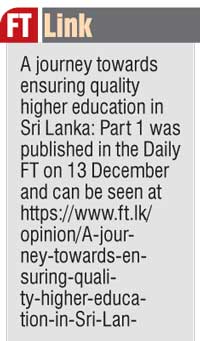 Also, between 2003 and 2015 World Bank and Asian Development Bank initiatives such as IRQUE (Improvement of Relevance and Quality in University Education), DEMP (Distance Education Modernisation Project) and HETC (Higher Education for 21st century) supported the UGC in the preparation of the manuals and in its efforts to enhance the relevance and quality culture in higher education.
Also, between 2003 and 2015 World Bank and Asian Development Bank initiatives such as IRQUE (Improvement of Relevance and Quality in University Education), DEMP (Distance Education Modernisation Project) and HETC (Higher Education for 21st century) supported the UGC in the preparation of the manuals and in its efforts to enhance the relevance and quality culture in higher education.
Initiatives were also taken in 2018, to introduce a non-competitive local ranking system for State universities, to provide the opportunity for universities to show case their specific strengths with evidence, with the use of an easily understandable ‘Sun Burst charts’ to help students with high selection scores to select their preferred study programmes.
Although, as a result of all such interventions, a culture of QA has been enrooted in the State higher education system, it should also be reiterated that as per globally-accepted best practices, the QA in higher education is best conducted by an independent QA agency.
Present system of granting degree awarding status to private higher education institutes in Sri Lanka
Let’s put it this way. If a mother from a faraway village ring to inquire how good a degree that is advertised in a newspaper is, before paying the enrolment fee for her daughter’s higher education, unfortunately still there is no transparent system, to provide a honest answer. Of course, most private HIEs may have their own internal quality assurance systems and some of them may be excellent, and some publicise international brand names, the names of the parent university or the approval from Ministry of Higher Education or UGC according to the old system.
In simple terms, as per the Universities Act No. 16 of 1978, Minister of Higher Education is the degree awarding authority for private HEIs. He/she appoints a specified authority to recommend to him/her whether an institute is good enough to award degrees. The specified authority as per the Act is the secretary of higher education. The specified authority delegates his/her powers either to a standing committee or an ad hoc committee or to one officer appointed by him. That is ‘exactly what the Act says’.
There is an ad hoc committee called the Standing Committee on Accreditation and Quality Assurance (SCAQA) that makes recommendations to the minister of higher education after site visits by a group appointed by a single senior officer in the Ministry of Higher Education.
This system is not on par with the QA system of Sri Lankan State universities. This system lacks transparency that is needed for quality assurance in higher education and is not in line with globally accepted good practices and guidelines for QA in higher education.
Another important point is that, if a private higher education institute wishes to offer degrees of foreign universities or foreign higher education institutes, they need not have to seek permission to offer degrees in Sri Lanka. This is another major defect in the system. Using this loophole in the system, some foreign higher educational institutes with questionable quality have entered Sri Lanka, offering certificate, diploma and degree courses.
Award of professional qualifications in Sri Lanka
In the case of professional recognition with stipulated bodies, many countries when they established independent QA and accreditation agencies linked those professional bodies under their umbrella in different ways. This at present is the globally accepted good practice guideline to enhance the transparency of the process.
There is a specific point that needs to be highlighted regarding the award of professional qualifications in Sri Lanka.
While appreciating the importance of obtaining concurrence of the stipulated professional and regulatory bodies who have subject expertise, in order to reduce the probability of gaining ownership and protectionism by a particular profession or discipline, the need to be viewed by an independent impartial body but still with the concurrence of such professional bodies is accepted as an important principle of good governance in higher education.
This concept was highlighted at the biennial global conferences of the International Network for Quality Assurance and Accreditation Agencies in Higher Education (INQAAHE) and Asia Pacific Quality Network - APQN held in Sri Lanka in March 2019 which Sri Lanka won the bid to host, beating China and Chile following a competitive bidding meeting at the INQUAAHE global conference in Bahrain in 2017.
It is relevant to note that QAA of the UGC received membership of both INQAAHE and APQN in 2006.
Need for independent National Quality Assurance and Accreditation Commission for Higher Education in Sri Lanka
While the UGC has established a sound transparent QA system for quality assurance and accreditation for State universities, quality assurance and accreditation of private higher education institutions continue to be a system with many loopholes.
Therefore, to enhance the accountability and good governance, the need has been recognised by the UGC and MoHE to establish a neutral and independent National Quality Assurance and Accreditation Agency with common assessment and accreditation standards and criteria and similar assessment processes to cover all public, private, local, and foreign higher education sectors operating in Sri Lanka at both undergraduate and postgraduate levels.
Many South Asian and ASEAN countries have National Accreditation Agencies. For example, the Malaysian Qualifications Agency (MQA) was set up under Malaysian Qualifications Act 2007 to quality assure and to accredit academic programs provided by State and non-State educational institutions in Malaysia. The National Assessment and Accreditation Council of India (NAAC) was established in 1994.
These are independent bodies run by professionals without political or trade union affiliations. They follow globally accepted principles of quality assurance and accreditation by independent confidential institutional and programme reviews conducted by quality auditors.
Therefore, a comprehensive proposal was formulated by the UGC and Ministry of Higher Education to establish through a transparent mechanism an independent ‘National Quality Assurance and Accreditation Commission for Sri Lanka’ with the support of the office of the Attorney General and the Legal Draftsman.
This new commission would act as the apex body for QA and Accreditation to provide that much needy seal, the National Quality Assurance and Accreditation certificate for any degree or diploma offered within the shores of Sri Lanka, be it, public or private, local, or foreign. This would help the regulated expansion of both public and private higher education in Sri Lanka and will help to showcase the island as a preferred destination for quality higher education to promote international student mobility. The concept was carefully designed to function without any political interference.
This is a significant shift from the quality assurance system of the State universities that has been evolving over two decades in Sri Lanka to the establishment of this new National Quality Assurance and Accreditation Commission for Higher Education to ensure quality in State and non-State HEIs. This would ensure common standards across all institutions and accreditation of all higher education programmes covering both State and non-State sectors. This will also align Sri Lanka with best international practices like many other regional countries.
It all sounds rosy so far. Then what happened?
After two years of efforts, the Gazette was released to establish the National Quality Assurance and Accreditation Commission for Higher Education on 14 June 2019. The quality and composition of this new National Commission needs a careful scrutiny. The composition of the Commission is a vital aspect for the transparency and independence of the proposed system and independence is mandatory to provide confidence to all stakeholders.
Therefore, the proposal was that the National Education Commission (NEC) nominate 15 persons with academic distinctions and proven capacity using a criterion-based system and submit to the University Grants Commission (UGC). The UGC using specific criteria to select nine out of 15 and submit to the President for the appointment. The President shall appoint these nine members, in consultation with the relevant subject minister and the President has the mandate to appoint the chairman.
However, when the final Bill was submitted by the Ministry of Higher Education to the Cabinet, and that is how the system goes, this transparency and independence had been removed at the ministerial level by changing the original statement to read as, ‘Nine members appointed by His Excellency the President from a panel of 15 persons nominated by the Minister’.
The question is: When will this Bill with restored transparency and independence see the light of the Sri Lankan public for implementation?
Policy reforms in higher education are not new. Such reforms have been presented to all governments, especially after the introduction of the open economy from 1990s. But it is regrettable that most of the objectives of these proposed reforms that came in from time to time are yet to be achieved by the Sri Lankan higher education system. Sadly, as in the past, this time too, it may be no different.
Why is that? That is because, whenever a government and ministerial change takes place in Sri Lanka, there has always been a strong resistance and reluctance to continue with the ongoing implementation processes of such policy reforms by the incoming ministers and senior administrators and therefore, the expected outcomes never take place.
Here, there is a fundamental lesson we can learn from the Indian system. Ever since independence in India, the changes of political leadership never interfered with two fundamental fabrics in their system. That is, politicians never interfered with the progress of science – that is why they could develop satellites and become nuclear – and they never interfered with the progress of education. Unfortunately, this does not happen in Sri Lanka.
In conclusion the concept of an independent national quality assurance and accreditation system to cover all HEIs has been launched in Sri Lanka too.
You may agree with me now that there is a long way to go to achieve the expected outcome due to this significant change that was brought into the bill at the last minute at the ministerial level with regard to the transparency in the appointment of members to this new independent Commission. With this last-minute change, after removing the independence of the Commission, the bill is already gazetted but not implemented.
What is needed now is the political will and the leadership at the highest level to revisit and restore the independence this bill deserves for the progress of Sri Lankan higher education. We earnestly wish that it may be the reality one day.
As Elina Roosevelt once said, I quote, “Progress is made by those who believe in the beauty of their dreams.”
Mr. President, members of the council, ladies and gentlemen, as I conclude this speech, I wish to say what Albert Einstein once said: “We can’t solve problems by using the same kind of thinking we used when we created them.”
Thank you.
